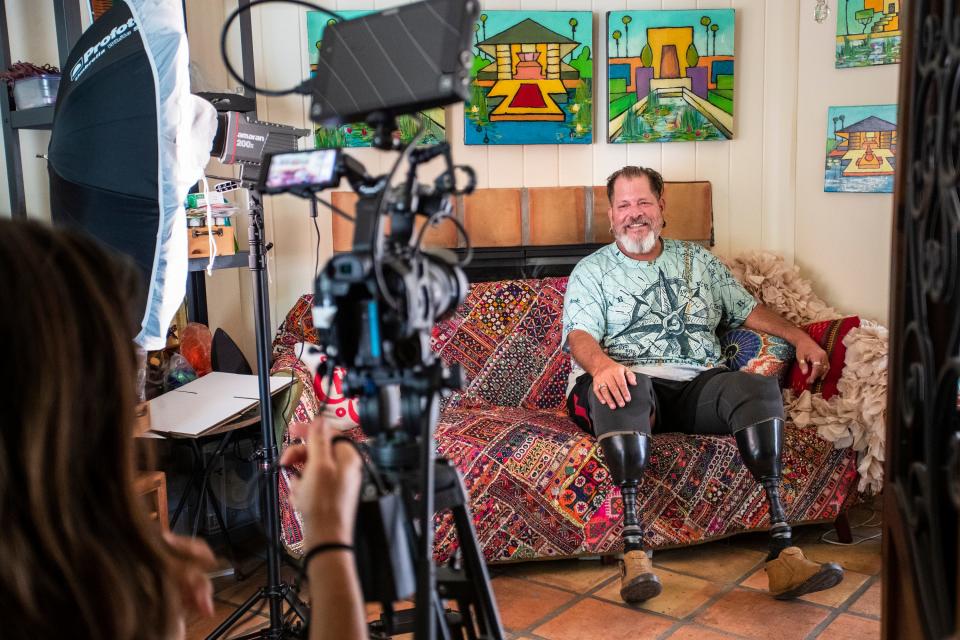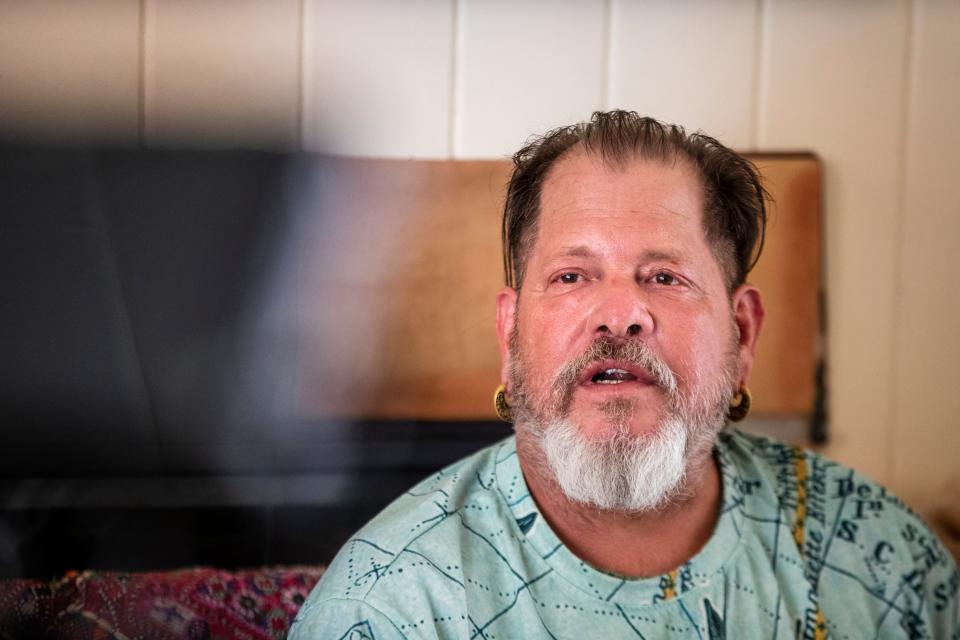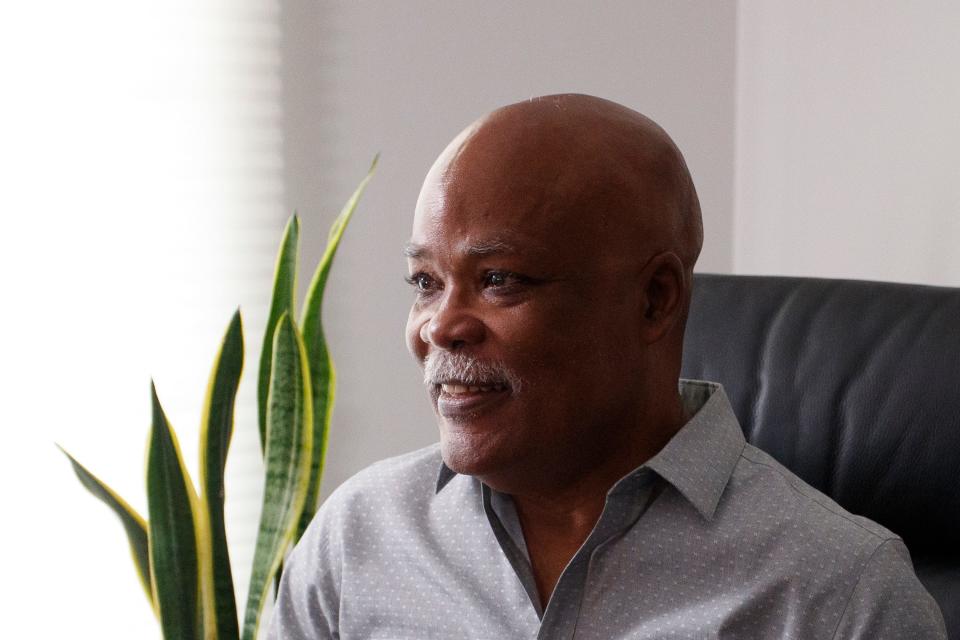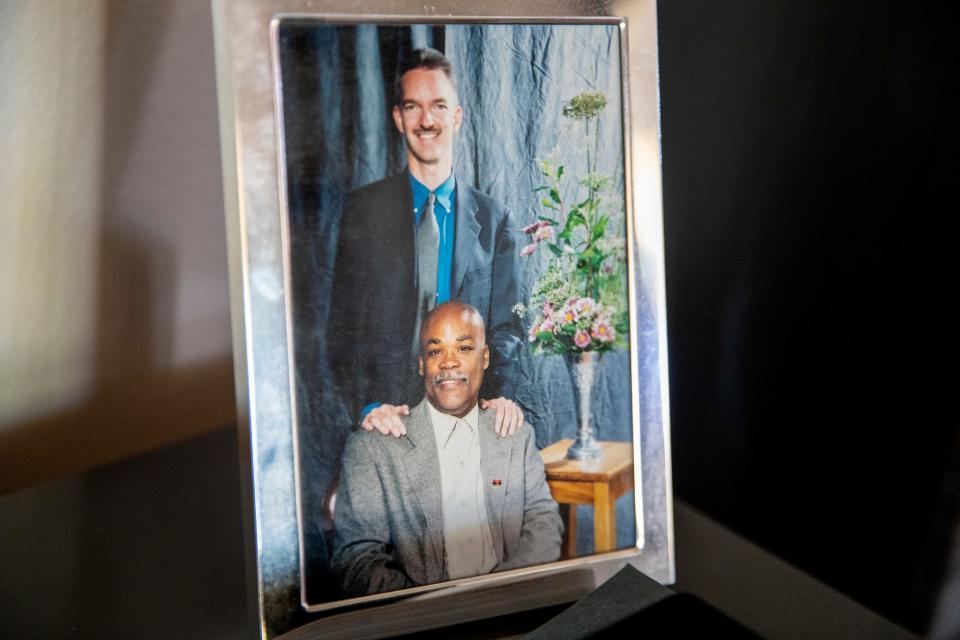Two local residents participate in national LGBTQ+ elders project The Outwords Archive
When Los Angeles film producer Mason Funk started The Outwords Archive, a national project to record, preserve and share the stories of LGBTQ+ elders, he wanted to capture as full and comprehensive of a portrait of the community as possible.
Since 2016, Funk has interviewed over 250 LGBTQ+ subjects in 35 states featuring a mixture of people of color, immigrants, people with disabilities and people of varying economic backgrounds. Some were present at important moments in history, such as the 1969 Stonewall Riots or the 1979 March on Washington, and some are longtime activists on LGBTQ+ issues.
On Aug. 12, he came to the Coachella Valley to record interviews with two LGBTQ residents: Gil Gerald of Cathedral City and Miguel Criado of Palm Springs.
"People often ask two questions, how do you find these people and what do you mean by elders? By elders, we consider chronology and actual numbers of years lived. We find our subjects through research," Funk said. "We bring in high numbers of people whose stories get lost, erased or are undervalued. We bend over backwards to bring them in and in greater numbers."

Gathering these stories has taken Outwords to large cities such as San Francisco, New York and Los Angeles, as well as small towns in Minnesota, Iowa, Arkansas and California. Funk said he values rural community builders as much as those in big cities raising millions of dollars for various LGBTQ causes.
"We interviewed a woman in Imperial County who founded an LGBT Center in Brawley and that's in the middle of nowhere, but for the people who live there, it's incredibly important there's an actual living presence and space for LGBT people," Funk said.
The 2020 Netflix documentary "Crip Camp" about a summer camp in the Catskills for disabled teenagers made Funk realize he needed to feature LGBTQ+ people with disabilities to provide representation for an otherwise "invisible population."
"I was like 'Holy crap, we haven't been going out of our way to find disabled queer people at all.' That's when we began a systematic effort to reach out," Funk said. "People just see them and think all they are is a disabled person. They forget they have feelings, emotions, sexuality and desires."
Utilizing art as an advocacy tool
As Funk and Director of Photography Kate Kunath prepared to interview Miguel Criado, they tried to determine what part of his Palm Springs apartment would be best to sit in — they wanted to get both him and his artwork in the shots.
One of the many pieces on display in Criado's home is a painting of Mexican artist Frida Kahlo as the Virgin of Sorrows posing in the Blue House in Mexico City, which is now the Frida Kahlo Museum.
"It's a whole political thing and I was very rebellious at that time," Criado said of his work.

While in his early 20s studying architectural design at the Massachusetts College of Art, a fall from a five-story building cost Criado one of his legs. His other leg was amputated 25 years later due to pain issues. But that didn't stop him from living in several cities in the U.S. — and abroad — and working in a variety of jobs. Those jobs include positions at the Boston’s Children Museum, Disney World and on the streets of Mexico City, where he painted en plein air.
After being diagnosed as HIV positive in 2001, he relocated to San Diego, where he painted a mural in the city's LGBT Community Center and was an HIV counselor at the San Diego American Indian Health Center. He also spent time living in Long Beach, where he worked with inner-city kids on arts and crafts projects before moving to Palm Springs in 2010.
Criado described his native Puerto Rico as "very colorful," with an intriguing history going back to 1493 when Christopher Columbus discovered the island during his second voyage. He added that there's a lot of "machismo" in Puerto Rican culture sanctioned by the Catholic church.
"Things have changed after the millennium, but before that, it was very repressive for gay people to live in that environment," Criado said.
Criado said it's important for young people to know LGBTQ history. He feels recent gains are only "scratching the surface" and there will be a time in the future when the community is included in matters of community, spirituality and economics.
"We have a say and make up for 15% to 17% of the population," Criado said. "Why can't we participate in government as well? A large percentage of artists are LGBTQ+. It's not a straight environment and has made a contribution to humanity that's not even acknowledged."

Participating in Outwords is important to Criado because he feels it provides a resource for people who may be struggling and said "that's what reaching out is all about."
Awareness and understanding for future generations
As Funk and Kunath set up equipment in Gil Gerald's living room, he shared his history as a longtime LGBTQ+ and HIV/AIDS activist. Gerald co-founded the National Coalition of Black Lesbians and Gays in 1978, served on the National Steering Committee for the 1987 National March on Washington for Lesbian and Gay Rights and worked in fundraising for HIV/AIDS health care.
"I really am interested in projects that preserve, reconstruct and record our history," Gerald said. "So much of it is lost. I'm relieved there's another venue in which we have an opportunity to raise the level of awareness and understanding for another generation."

After Gerald was contacted by Funk to participate, he noticed many people he knew on Outwords, such as ABilly Jones-Hennin, another cofounder of the National Coalition of Black Lesbians and Gays. The organization started in 1978 in Columbia, Maryland before moving into Baltimore and Washington, D.C., eventually breaking off into two separate organizations. Chapters then sprung up across the U.S.
"(The organization) responded to the fact that in the late ’70s, most LGBT organizations had far fewer Black and people of color than one would expect," Gerald said. "The organizations at the time were the Gay Activist Alliance and The Gertrude Stein Democratic Club, and they were primarily white organizations in a city that was majority Black. Some of us were not so much antagonistic, but we said there's something wrong with this picture and needed to get involved."
During a 1979 meeting between Black LGBTQ+ organizers and former President Jimmy Carter's staff, Gerald raised issues affecting people seeking to visit or immigrate to the U.S.
"People today are focused on issues surrounding the Southern border, but the fact of the matter is in the ’70s, some of these people were being stopped and prevented from entering the United States at airports and customs [because] they suspected [they] were gay."

It was an issue he was familiar with being born to an American mother in Panama.
"Citizenship was not automatically conveyed to me," Gerald said. "By the time I decided I was going to become a U.S. citizen, I was already out. I couldn't go and lie in my application. I had to list my associations, meaning what organizations I've been part of. I was asked 'Are you gay?' and I said yes. That ended the interview and brought it to a close. It took me four years to fight it, but I won."
Some of the material is requested by instructors in high schools or those in academia. Gerald said it's really important that these interviews be used as a resource for LGBTQ+ history.
"Too many times during the ’90s, people were saying 'We did this for the first time' and it was like 'No you didn't and it's been done before,'" Gerald said. "It annoyed me a little bit. At a time like now where there's absolute determination to not have any Black history and it's been removed from the curriculum, what's going to happen with what we've achieved? That's going to lead to LGBTQ+ history being suppressed, and I think our ability to understand the connections between racism, sexism and classism was on-time."
Brian Blueskye covers arts and entertainment for the Desert Sun. He can be reached at brian.blueskye@desertsun.com or on Twitter at @bblueskye.
This article originally appeared on Palm Springs Desert Sun: Two local residents participate in national LGBTQ+ elders archive

